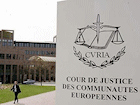


RKL-President Graupner represents ILGA-Europe (the European Region of the International Lesbian and Gay Organisation ILGA) in a landmark case before the Court of Justice of the European Union (ECJ). In Jürgen Römer vs. City of Hamburg (C-147/08) the Advocate General asks the Court to decide that same-sex couples must have access to employment benefits for married couples in all 27 member-states.
Mr. Jürgen Römer is a retired employee of the City of Hamburg. Since 1969, he has been living with his partner, Mr. Alwin Ulrich, in committed loving relationship, so for over 40 years. In 1999 they registered their partnership under the City of Hamburg’s registration scheme and immediately after the introduction of federal registered partnership they entered “life partnership” in 2001.
The City of Hamburg pays to Mr. Römer a lower pension then to its pensioners with a married partner. His retirement pension is lower then for married pensioners solely on the basis that he has a (same-sex) registered partner and not a (different-sex) married partner. Germany allows registered partnership only for same-sex couples and civil marriage only for opposite-sex couples. Mr. Römer sued the City of Hamburg and the Hamburg Labour Court referred the case to the ECJ for interpretation of the EU-Antidiscrimination-Directive.
Mr. Römer is represented by Hamburg attorney Birgit Boßert and by ILGA-Europe with ILGA-Europe itself represented by RKL-president Dr. Helmut Graupner.
Advocate General Niilo Jääskinen recently presented his opinion saying that same-sex couples must have access to employment benefits for married couples in all 27 member-states. Based on the EJC’s landmark-judgment in Maruko vs. VddB (01.04.2008), which has also been litigated by RKL-president Dr. Helmut Graupner, and following the line of argument put forward by ILGA-Europe the Advocate General argues that marriage and family law rests in the competence of the member-states and not of the Union. But if a member-states decides to restrict civil marriage to opposite-sex couples only, it nevertheless, under the EU-Antidiscrimination-Directive, has to guarantee equal treatment and grant homosexual couples (despite not being married) access to all the employment benefits granted to married couples.
If a member-state has a registered partnership putting same-sex couples into a legal position comparable to married couples, exclusion from marriage benefits constitutes direct discrimination. And if a member-states created a registration scheme for same-sex couples inferior to civil marriage or if it grants same-sex couples no registration at all, exclusion constitutes indirect discrimination.
General principle of Union law
Protection of marriage and the family as such, the Advocate General says, cannot serve as valid justification for such discrimination (par. 106-111). Protection of marriage and the family in a national constitution, as it is the case in Germany, cannot compromise the prohibition of discrimination on the basis of sexual orientation. Union law supersedes also national constitutional law.
The Advocate General finds that the prohibition of discrimination on the basis of sexual orientation is a general principle of Union law) (par. 129-133). So the prohibition of (direct or indirect) discrimination (on the ground of sexual orientation) is not limited to periods after entry into force of the EU-Antidiscrimination-Directive (2000/78/EC) or after expiration of its implementation period (December 2003), but it takes full effect also for periods preceding those dates. So equal treatment (and compensation) can be claimed back to the beginning of a certain discrimination.
In most of the cases the ECJ follows the Advocates Generals’ opinion.
„The Advocate General’s opinion is groundbreaking for the whole Union“, says Dr. Helmut Graupner, president of the Austrian lesbian and gay rights organization Rechtskomitee LAMBDA (RKL) and counsel of Jürgen Römer, “If the ECJ follows it, all 27 member-states will have to grant same-sex couples access to all the employment benefits married couples enjoy, no matter if they allow registered partnership or not”.
See the opinion of the Advocate General at: http://curia.europa.eu
www.RKLambda.at